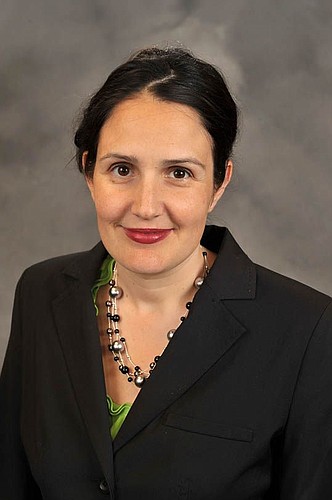
Pro bono attorney Ericka Curran recently achieved a life-changing result for a disabled, immigrant client.
This was no simple work authorization case. Read about Curran’s efforts and outcome.
What were the basic facts of your case?
In this particular case, the client, a foreign national, could not be returned to his country of origin because he is essentially stateless, which means he does not have a country of true citizenship.
This often happens to refugee families. Because of this, he was eligible for work authorization in the United States but needed legal assistance to obtain work authorization.
He came to the Florida Coastal School of Law Legal Clinic during the winter break period when the clinic is typically not taking new cases. I decided to assist him as my own pro bono client apart from the clinic.
This particular client was also deaf but did not sign. He communicated by writing in English (his second language).
What were you able to accomplish for your client?
I was able to get work authorization for my client and have the filing fees waived which will enable him to seek employment and stabilize his living situation.
Why was the outcome important to your client?
My client has no one in the U.S. and needs to work in order to support himself. He has faced many challenges due to his disability and finding secure employment will allow him to get stable housing and move forward with his life. He is very eager to work and contribute.
Why was the experience important to you? That is, what did you gain from the experience?
As a clinical professor at Florida Coastal School of Law, I try to take some pro bono cases of my own (that is, not the cases I take for work with students) so that I can give back to the community and demonstrate to my students the role we have as attorneys in helping others access justice.
Having a law license is a privilege, and I am conscious of how important it is to give back. It is always an honor to see a how a client’s life can be improved by our work.
What is the name of your firm? In what areas do you practice?
I am the director of clinical programs at Florida Coastal School of Law, and I run the Immigrant and Human Rights Clinic.
We focus on serving indigent immigrants in need of humanitarian immigration benefits, such as asylum and human trafficking. We also strive to serve disabled immigrants and children who would not be able to navigate the system on their own.
What advice do you have for other attorneys considering pro bono involvement?
Pro bono work always leaves me feeling fulfilled and inspired. To see a client overcome so many challenges and know that I have helped in some small way is an amazing feeling.
I see also that it builds trust within communities, which can lead to future business for attorneys as they seek to build their practice with fee-paying clients. Even though we do not charge for services in our clinical programs at Florida Coastal, we often have clients come back and want to hire us.
Recently, one of our clinic graduates, Andrea Reyes, got a call from one her former clinical cases as a law student.
The client saw that Ms. Reyes had started her own firm and said, “I know that attorney from when she helped me in my time of need. Now that I am able to hire her, she is the one I trust to do good work.”
There are many opportunities for pro bono involvement throughout the 4th Judicial Circuit from direct client representation to providing information at group information clinics. For more information on pro bono opportunities contact Kathy Para, chair, The JBA Pro Bono Committee, [email protected].